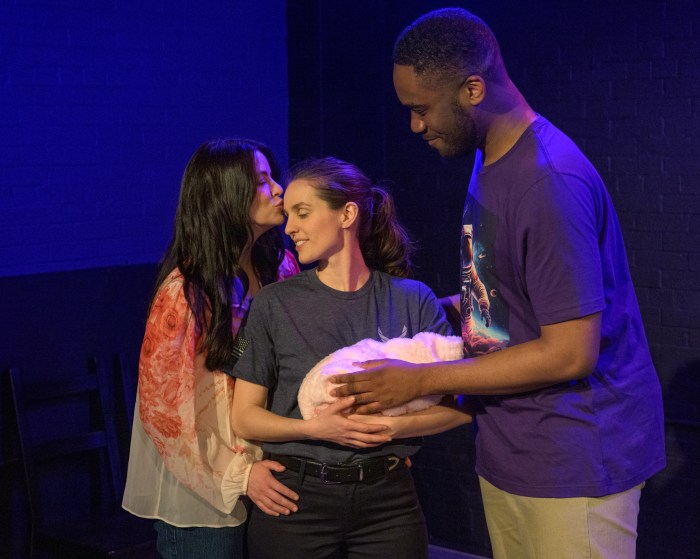Three problematic plays in search of a super-director
John Turturro has got considerable talent and grit, no doubt about it. But not even he has the power to reign in “Relatively Speaking,” a trio of chaotic, disparate one-act comedies premiering at the Brooks Atkinson Theatre.
While loosely grouped under the heading of “fraught family bonds,” the sheer abundance of scenarios, ideas, and actors (an ensemble of 16, many of them heavyweights) is simply too staggering for Turturro to control — especially on a first outing as a Broadway director.
Naturally, something’s got to give.
The most glaring casualty is the opening play, “Talking Cure,” written by Ethan Coen, whose films Turturro has famously starred in. Coen breaks the rules by creating two discrete parts — they sure look like separate acts to me — whose connections to each other are murky at best. The first finds a mental patient (Danny Hoch, laboring too hard to animate his oafish character) verbally sparring with his doctor (Jason Kravits), who is trying, with little success, to root out the cause of his patient’s violent tendencies.
The answer, supposedly, lies somewhere is the second part, set several decades earlier, where his angry parents wage domestic war across the dining room table. Trouble is, the characters are unlikable and we don’t care what crime landed him in the psychiatric ward or what inherited traits caused him to become such a wretch.
Two weeks into previews Fred Melamed, who played the father, abruptly quit due to “creative differences.” Smart move.
Infinitely more successful is Elaine May’s “George Is Dead,” a noir comedy with a coil of mystery that unwinds in delicious fits and starts. Marlo Thomas (yes, that girl), in the most sublime performance of the evening, plays Doreen, a rich, ditzy socialite who strenuously resists her advancing age — and the onset of grief due to the sudden death of her husband, about which she learned just minutes before she knocks on the door of long-lapsed childhood chum Carla (Lisa Emery).
More demanding than distraught, she takes advantage of Carla’s hospitality, treating her like one of her staff — which is not such a stretch because, many years earlier, Carla’s mother was her nanny. Carla’s shabby apartment is a far cry from Doreen’s 17-room Southampton estate.
“I don’t have the depth to feel this bad,” says Thomas, sounding eerily like her Ann Marie character in “That Girl.”
When Carla’s distraught husband (Grant Shaud, in a brief but affecting performance) shows up, all hell breaks loose. Doreen’s epiphany at the funeral might have been more potent if we hadn’t seen it coming a mile away. Carla’s epiphany, on the other hand, is astonishing.
The final play, Woody Allen’s “Honeymoon Motel,” is the madcap one of the bunch. It’s a throwback to those old-school farces set in a single room — in this case, a tacky honeymoon suite — which starts out empty, then, after a series of frantic door-knocks, gradually fills with goofy characters and bizarre conflicts until the uproarious climax.
The plot is set in motion with Jerry, who appears to be a love-struck groom (Steve Guttenberg, perfectly cast), with his young bride Nina (Ari Graynor), about to consummate their nuptials at the titular motel. When Jerry’s buddy Eddie (Shaud) barges in, we learn that the wedding did not exactly go according to plan. Before long, family members, friends, a drunken rabbi, and, finally, a pizza delivery guy, have packed into the room.
Mind you, there are some brilliantly comic moments. Yet instead of a tight ensemble, it’s more like a free-for-all. The timing is off, lines get lost, and certain plot details contradict each other. As Nina’s mother, Julie Kavner, who has been in several of Allen’s films and is the voice of Marge Simpson, can’t hold her own against the likes of Caroline Aaron, who plays Jerry’s “other” wife.
Astute theatergoers will detect a creepy parallel to a certain marriage scandal in Allen’s own personal life a few years back. The preachy, tidy message at the end — “Life is short and there are no rules” — comes across as a shoulder-shrugging excuse for his behavior, which, depending on your sympathies, is either admirable or abominable.
“Somewhere Noel Coward is turning over in his grave,” says Eddie, observing the pandemonium. Given Turturro’s unsure direction of this amusing but bumpy enterprise, I tend to agree.
Essentials:
RELATIVELY SPEAKING
Brooks Atkinson Theatre
256 W. 47th St.
Tue. at 7 p.m.; Wed.-Sat. at 8 p.m.
Wed., Sat. at 2 p.m.; Sun at 3 p.m.
$67-$127; ticketmaster.com

































